Part six. Deflation, wage and price controls, and worthless bonds?
This is Part six of a series showing how inflation, deflation, barter, tariffs, taxes, postage, war, counterfeiting, history, economics, free trade, famine, dearth, climate, auctions, precious metals, religion, and education are combined into one great whole.
Part 6. Why study deflation,
wage and price controls, and worthless bonds?
 Stamp Postage was 15 cents when the White House Christmas lights were turned off to save energy. It would take 4 of these to mail a letter in 2018. 1980 15c Helen Keller and Anne Sullivan, in Tuscumbia Alabama. Helen was deaf and blind from a infection as a baby. Anne was the tutor who taught Helen hand sign language.
Stamp Postage was 15 cents when the White House Christmas lights were turned off to save energy. It would take 4 of these to mail a letter in 2018. 1980 15c Helen Keller and Anne Sullivan, in Tuscumbia Alabama. Helen was deaf and blind from a infection as a baby. Anne was the tutor who taught Helen hand sign language.
Zimbabwe in the 1980s had hyper inflation, eventually wiping out domestic currency, in that no one would accept it, neither labor or merchant.
14) Deflation from wage control. England 1395. After the plague loss of a fourth of the population in England, the resulting in shortage of labor caused wages and products prices to soar. The Parliament, representing those interests pay wages, rather than receiving wages, reacted with caps or limits on labor wages (but not product prices). The laborers responded with riots in London. The riots were put down with the army.
During World War Two, the United States, as with other countries, set wage and price controls to control inflation. Billions of dollars of war contracts were set with industry, and the man power of fourteen million men was absorbed into the services and removed from the job market. The US population in 1940 was 132 million, so the loss of manpower to the army and navy was about one in three adult males. So more money would be chasing fewer services. The result was many women replaced the men on the assembly lines. Companies with army contracts competed for skilled labor with each other, but were prohibited from paying more to lure workers away from competition. Planes, ships, ammo, weapons, clothes, food, were all in great demand, and if the employers could not get the labor, they would default their contracts. In the middle of the war, some companies wanted to offer benefits, as a competitive advantage, such as health care and pensions. They sought permission from the Wartime Wage and Price control board, which allowed the health care as not violating the wartime wage and price controls. Rapidly as one company offered health care for the employee, and soon the family, others had to match the benefits or lose workers, and the Blue Cross and Blue Shield industry was born. Within two decades after the war, the Congress passed governmental health care for all seniors, entitled Medicare, which was expanded later to include the disabled. All this to control inflation in 1943.
Chile in the 1970s had hyper inflation. Mexico, in 1995, devalued its money, the peso, 5 fold so both wages and domestic products were cheaper, but imported product prices soared by five fold.
Brazil in the 1960s had hyper inflation, and had to revalue its basic unit by 1,000, meaning 1,000 of the old cruzeros were worth one of the new.
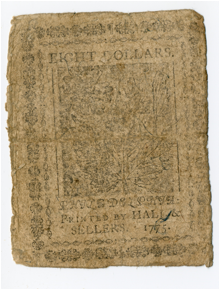 12) Deflation from counterfeiting, paper currency, and war. United States War of Independence 1775 to 1790 not worth a continental, paper money.
12) Deflation from counterfeiting, paper currency, and war. United States War of Independence 1775 to 1790 not worth a continental, paper money.
The United Colonies. Continental Currency Eight Dollars No.44388,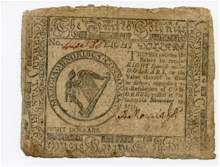 This Bill entitles the Bearer to receive Eight Spanish milled Dollars, or the Value thereof in gold or Silver, according to a Resolution of Congress, passed at Philadelphia November 29, 1775. Abe Morris Jr. Majora. Minoribus.
This Bill entitles the Bearer to receive Eight Spanish milled Dollars, or the Value thereof in gold or Silver, according to a Resolution of Congress, passed at Philadelphia November 29, 1775. Abe Morris Jr. Majora. Minoribus.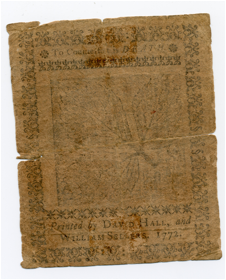 Consonant [Latin to English, the Great and Small agree.]
Consonant [Latin to English, the Great and Small agree.]
Franklin remarked the $280 million in continental currency was the tax for the war.
1772, 3 shilling SN 26828 TO counterfeit is death Printed David Hall William Sellers 066
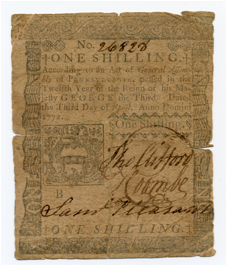 No. 26828 One SHILLING According to an Act of General Assembly of Pennsylvania passed in the 12thYear of the Reign of his Majesty GEORGE the Third, Dated the 3rd day of April Anno Domini 1772. One Shilling. Tho[mas] Clifford Coombe, Sam Pleasant
No. 26828 One SHILLING According to an Act of General Assembly of Pennsylvania passed in the 12thYear of the Reign of his Majesty GEORGE the Third, Dated the 3rd day of April Anno Domini 1772. One Shilling. Tho[mas] Clifford Coombe, Sam Pleasant
A Farmer in west New York had cleared land, removed trees and stumps, and up rode an easterner and offered lots of cash for the farm, much more than market value, in continental currency. The westerner sold for cash, then learned the money was worthless in Boston and New York, and what to do? Ride west faster than the news traveled and buy land or stock before they found out on the frontier. True story, the farmer who was stuck with the bad currency.[i] After a decade, the new Federal government made good on the money which had been gathered into the hands of speculators at one cent on the dollar. The bad reputation of the continental currency stopped the new United States from issuing currency for 2 generations, but local banks were permitted to print and did issue currency until the economic collapse of 1838. 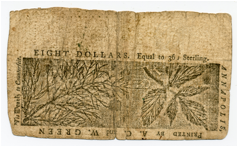 Eight Dollars Equal to 36 Ss Sterling, Annapolis, Printed by A.C. and W Green, Tis Death to Counterfeit. Eight Dollars No. 10672 This indented Bill of Eight Dollars shall entitle the Bearer hereof to receive Bills of exchange payable
Eight Dollars Equal to 36 Ss Sterling, Annapolis, Printed by A.C. and W Green, Tis Death to Counterfeit. Eight Dollars No. 10672 This indented Bill of Eight Dollars shall entitle the Bearer hereof to receive Bills of exchange payable 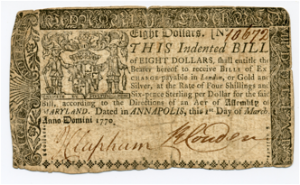 in London or gold and Silver, at the Rate of Four Shillings and Six pence Sterling per Dollar for the said Bill, according to the Directions of an Act of Assembly of Maryland, Dated in Annapolis, This 1st Day of March Anno Domini 1770. VIII DOLLAR. H Clapham, T E Conden
in London or gold and Silver, at the Rate of Four Shillings and Six pence Sterling per Dollar for the said Bill, according to the Directions of an Act of Assembly of Maryland, Dated in Annapolis, This 1st Day of March Anno Domini 1770. VIII DOLLAR. H Clapham, T E Conden
Under the miner with the shovel and fisherman with the crest of Baltimore between them is a border written Crescite et Multiplicamini. Crescite is given as Latin for “come ye to be” “become ye visible, spring ye from, arise ye, come ye forth” “increase ye, rise ye, grow ye, thrive ye; multiply ye, augment ye”. Multipli is multiply ad Camini is stove, furnace, foundry, vent for fire. Translation increase and multiply, or ‘spring ye up and with much fire!’
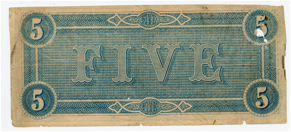 13) Deflation from loss of currency. US Civil war – Southern States currency and bonds issued in 1861 were wiped out 1865. As recently as 1965, a century later, they were priced at 1% of face for coin and currency collectors, but 50 years later 2018, they are at par or higher for collectors.
13) Deflation from loss of currency. US Civil war – Southern States currency and bonds issued in 1861 were wiped out 1865. As recently as 1965, a century later, they were priced at 1% of face for coin and currency collectors, but 50 years later 2018, they are at par or higher for collectors.
 1864 $5 #54874 Capitol Richmond Virginia Memminger CSA 055. Two Years after the ratification of a treaty of peace between the confederate states and the United States. The Confederate States will pay to Bearer Five Dollars Richmond February 17, 1864. Of course due to the inflation of prices and products since 1864, the $5 which may have purchased 2 adult steers in Texas in 1864, weighing 700 to 800 pounds, will only buy one quarter pounder (4 ounces) of beef hamburger in 2018.
1864 $5 #54874 Capitol Richmond Virginia Memminger CSA 055. Two Years after the ratification of a treaty of peace between the confederate states and the United States. The Confederate States will pay to Bearer Five Dollars Richmond February 17, 1864. Of course due to the inflation of prices and products since 1864, the $5 which may have purchased 2 adult steers in Texas in 1864, weighing 700 to 800 pounds, will only buy one quarter pounder (4 ounces) of beef hamburger in 2018.
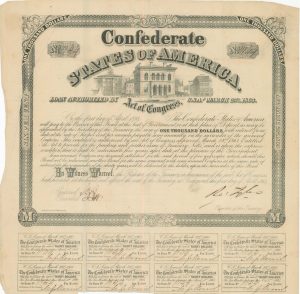 $1000 Confederate States of America bond, issued 1863 with 2 story masonry building featured, and 8 coupons, serial number #11144. The coupons were never redeemed as the war was lost. ‘‘On the first day of April 1893, The Confederate States of America, will pay to the Bearer of this Bond at the Seat of Government or at such place of Deposit, as may be appointed by the Secretary of the Treasury, the sum of One Thousand Dollars with interest from date at the rate of Six per cent per annum payable semi-annually on the surrender of the annexed Coupons. This contract is authorized by an Act of Congress, approved March 23rd, 1863. Entitled ‘An Act to provide for the funding and further issue of Treasury Notes, and is upon the express condition, that it shall be redeemable five years after date at the pleasure of the Government. Semi-annual Coupons are hereunto attached for the said perioud of five years after which should this Bond not be redeemed another Bond for the same amount with semi-annual Coupons, at the same rate of interest, for the remainder of the thirty years will be delivered to the holder, upon the surrender of this Bond. In Witness Whereof, the Register of the Treasury in pursuance of the said, Act of Congress, hath hereunto set his hand and affixed the seal of the Treasury at Richmond this first day of April 1863. C. S. Loan of March 23rd 1863, The Confederate States of America will pay to Bearer the sum of Thirty Dollars, for Six Month Interest due April 1st and Oct. 1st, 1868, 1867, 1866, 1865, 1864, on Bond No. 11144 For $1,000.’’ Told deflation of the bond brought its value to zero, and no coupons were redeemed.’’
$1000 Confederate States of America bond, issued 1863 with 2 story masonry building featured, and 8 coupons, serial number #11144. The coupons were never redeemed as the war was lost. ‘‘On the first day of April 1893, The Confederate States of America, will pay to the Bearer of this Bond at the Seat of Government or at such place of Deposit, as may be appointed by the Secretary of the Treasury, the sum of One Thousand Dollars with interest from date at the rate of Six per cent per annum payable semi-annually on the surrender of the annexed Coupons. This contract is authorized by an Act of Congress, approved March 23rd, 1863. Entitled ‘An Act to provide for the funding and further issue of Treasury Notes, and is upon the express condition, that it shall be redeemable five years after date at the pleasure of the Government. Semi-annual Coupons are hereunto attached for the said perioud of five years after which should this Bond not be redeemed another Bond for the same amount with semi-annual Coupons, at the same rate of interest, for the remainder of the thirty years will be delivered to the holder, upon the surrender of this Bond. In Witness Whereof, the Register of the Treasury in pursuance of the said, Act of Congress, hath hereunto set his hand and affixed the seal of the Treasury at Richmond this first day of April 1863. C. S. Loan of March 23rd 1863, The Confederate States of America will pay to Bearer the sum of Thirty Dollars, for Six Month Interest due April 1st and Oct. 1st, 1868, 1867, 1866, 1865, 1864, on Bond No. 11144 For $1,000.’’ Told deflation of the bond brought its value to zero, and no coupons were redeemed.’’
Twice in our history, the currency has failed, both after wars, the first was the war of independence (1777-1787), the second was the war between the states (1861-1865). The use of specie, or precious metals which were the fall back after currency failed, had been gold, silver and copper. These have been replaced by copper, nickel, and zinc as of 2018.
Disclaimer: The author of each article published on this web site owns his or her own words. The opinions, beliefs and viewpoints expressed by the various authors and forum participants on this site do not necessarily reflect the opinions, beliefs and viewpoints of Utah Standard News or official policies of the USN and may actually reflect positions that USN actively opposes. John Choate © No claim in public domain or fair use.
[i] The Choates in America, 1896, p. 88, By Cogswell. ‘’[Jacob Choate] About the time of the collapse of the Continental money, [Jacob] was visited by a man on horseback who wished to purchase his place, which he then sold; and on completion of title and receipt of the money, the purchaser informed him that the bills were worthless on the sea-coast, and advised him to mount his horse and do as he had clone, hasten to some place where the money was current. He went subsequently to Enfield, N. H., visited Canada in 1796, and on his return sold out to a Boston wholesale merchant by the name of Oliver Holden for $15,000, to be paid in goods for the Canada trade. He went down for his goods, found Holden bankrupt and in jail, got one thousand dollars’ worth of codfish, and went in 1797 to Canada. He located in Glanford, nine miles from the city of Hamilton, with his four sons, Thomas, Jacob, Nathan, and James. Nathan died in 1813. The others left a goodly number of descendants, many of whom are living today [1896] in Canada and in the United States. In the War of the Revolution, Mr. Choate seems to have joined an expedition to Rhode Island, Aug. 9 to Aug. 27, 1778. He was a private in Col. Moses Kelly’s Regiment and Capt. Joshua Bagley’s Company. Captain Bagley was of Hopkinton, New Hampshire Vid. New Hampshire Revolutionary Rolls, Vol. 2, p. 548.
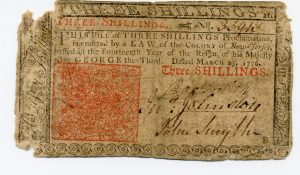 Three Shilling. Bill of Three Shillings Proclamation, is emitted by a Law of the Colony of New jersey, passed in the Fourteenth Year of the Reign of his Majesty King George the
Three Shilling. Bill of Three Shillings Proclamation, is emitted by a Law of the Colony of New jersey, passed in the Fourteenth Year of the Reign of his Majesty King George the 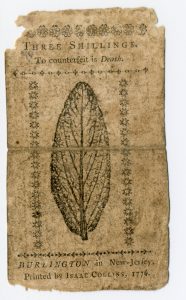 Third, Dated March 25, 1776, Three Shillings, Johnston, John Smyth, No 33913
Third, Dated March 25, 1776, Three Shillings, Johnston, John Smyth, No 33913
Utah Standard News depends on the support of readers like you.
Good Journalism requires time, expertise, passion and money. We know you appreciate the coverage here. Please help us to continue as an alternative news website by becoming a subscriber or making a donation. To learn more about our subscription options or make a donation, click here.
To Advertise on UtahStandardNews.com, please contact us at: ed@utahstandardnews.com.


Comments - No Responses to “Part six. Deflation, wage and price controls, and worthless bonds?”
Sure is empty down here...